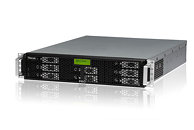- Joined
- Oct 9, 2007
- Messages
- 47,853 (7.39/day)
- Location
- Dublin, Ireland
| System Name | RBMK-1000 |
|---|---|
| Processor | AMD Ryzen 7 5700G |
| Motherboard | Gigabyte B550 AORUS Elite V2 |
| Cooling | DeepCool Gammax L240 V2 |
| Memory | 2x 16GB DDR4-3200 |
| Video Card(s) | Galax RTX 4070 Ti EX |
| Storage | Samsung 990 1TB |
| Display(s) | BenQ 1440p 60 Hz 27-inch |
| Case | Corsair Carbide 100R |
| Audio Device(s) | ASUS SupremeFX S1220A |
| Power Supply | Cooler Master MWE Gold 650W |
| Mouse | ASUS ROG Strix Impact |
| Keyboard | Gamdias Hermes E2 |
| Software | Windows 11 Pro |
What is a bit and what exactly does it stand for? A bit stands for "binary digit," the set of numbers used by computing devices to process commands. A 32-bit system demonstrates great performance but if one is in need for improvement; 64-bit is the solution to solve bottlenecks. In short, 64-bit allows the system to calculate and process more data compared to the lesser 32-bit. Ultimately, Thecus upgrades the new 7-bay N77000PRO and 8-bay N8800PRO v2 models to 64-bit. Some key benefits of switching from 32-bit to 64-bit: improved performance, capability to process more data at a time, and better overall structure.


We'll start off with better overall structure, as some might be confused by the concept. In a nutshell, hardware and software development seldom halts; the NAS industry is constantly moving forward and 4GB RAM is becoming a standard. It's safe to bet that the transition to 64-bit will allow users to get the most up-to-date and best performing storage system available, with the use of 4GB RAM or over. In addition, users won't need to upgrade their platform for a long duration since 64-bit is the future and is ideal for smooth NAS operation.
It's apparent that users who choose a 7-bay or 8-bay NAS are those who manage large amounts of data. As a result, Thecus eliminates possible barriers by utilizing 64-bit on the new N7700PRO and N8800PRO v2 models. Hardware architecture has the ability to hinder the amount of data that is able to process at a given time. For instance, a true 64-bit motherboard requires a true 64-bit CPU, suggested amount of RAM and true 64-bit software for the NAS to engage full throttle. As a result, 64-bit configuration allows more data to be processed at a time, offering an efficient storage device.
Using a 64-bit NAS improves performance in many ways such as increased responsiveness, more memory and processing power. NAS users using 32-bit systems face possible bottlenecks; one per se restricts performance to a certain level. For instance, if a system is only meant to handle 3GB of RAM, installing 4GB of RAM won't prove performance gains. NAS gurus can rest assure that the v2 models, 7-bay and 8-bay NAS will have the most advanced hardware and technology to keep up with future development and tackle huge amounts of data without limits.
In conclusion, the new N7700PRO and N8800PRO v2 equip a 64-bit platform to foster the smoothest NAS management experience available. Never again have doubts about bottlenecks or encounter NAS processing restrictions. See for yourself, enter the 64-bit realm and experience improved performance, large data processing capability and better overall structure that 64-bit has to offer.
For more information on N7700PRO v2, go to this page.
For more information on N8800PRO v2, go to this page.
View at TechPowerUp Main Site


We'll start off with better overall structure, as some might be confused by the concept. In a nutshell, hardware and software development seldom halts; the NAS industry is constantly moving forward and 4GB RAM is becoming a standard. It's safe to bet that the transition to 64-bit will allow users to get the most up-to-date and best performing storage system available, with the use of 4GB RAM or over. In addition, users won't need to upgrade their platform for a long duration since 64-bit is the future and is ideal for smooth NAS operation.
It's apparent that users who choose a 7-bay or 8-bay NAS are those who manage large amounts of data. As a result, Thecus eliminates possible barriers by utilizing 64-bit on the new N7700PRO and N8800PRO v2 models. Hardware architecture has the ability to hinder the amount of data that is able to process at a given time. For instance, a true 64-bit motherboard requires a true 64-bit CPU, suggested amount of RAM and true 64-bit software for the NAS to engage full throttle. As a result, 64-bit configuration allows more data to be processed at a time, offering an efficient storage device.
Using a 64-bit NAS improves performance in many ways such as increased responsiveness, more memory and processing power. NAS users using 32-bit systems face possible bottlenecks; one per se restricts performance to a certain level. For instance, if a system is only meant to handle 3GB of RAM, installing 4GB of RAM won't prove performance gains. NAS gurus can rest assure that the v2 models, 7-bay and 8-bay NAS will have the most advanced hardware and technology to keep up with future development and tackle huge amounts of data without limits.
In conclusion, the new N7700PRO and N8800PRO v2 equip a 64-bit platform to foster the smoothest NAS management experience available. Never again have doubts about bottlenecks or encounter NAS processing restrictions. See for yourself, enter the 64-bit realm and experience improved performance, large data processing capability and better overall structure that 64-bit has to offer.
For more information on N7700PRO v2, go to this page.
For more information on N8800PRO v2, go to this page.
View at TechPowerUp Main Site

